09高考英语易错题解题方法大全(4):完形填空(下)
- 格式:doc
- 大小:204.50 KB
- 文档页数:15
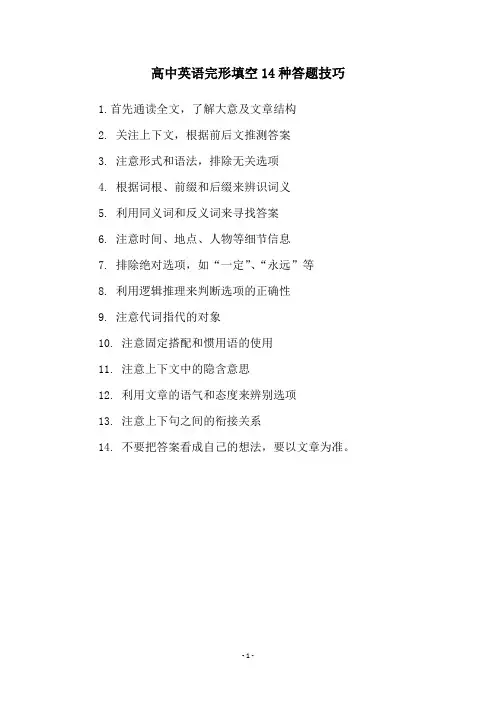
高中英语完形填空14种答题技巧
1.首先通读全文,了解大意及文章结构
2. 关注上下文,根据前后文推测答案
3. 注意形式和语法,排除无关选项
4. 根据词根、前缀和后缀来辨识词义
5. 利用同义词和反义词来寻找答案
6. 注意时间、地点、人物等细节信息
7. 排除绝对选项,如“一定”、“永远”等
8. 利用逻辑推理来判断选项的正确性
9. 注意代词指代的对象
10. 注意固定搭配和惯用语的使用
11. 注意上下文中的隐含意思
12. 利用文章的语气和态度来辨别选项
13. 注意上下句之间的衔接关系
14. 不要把答案看成自己的想法,要以文章为准。
- 1 -。
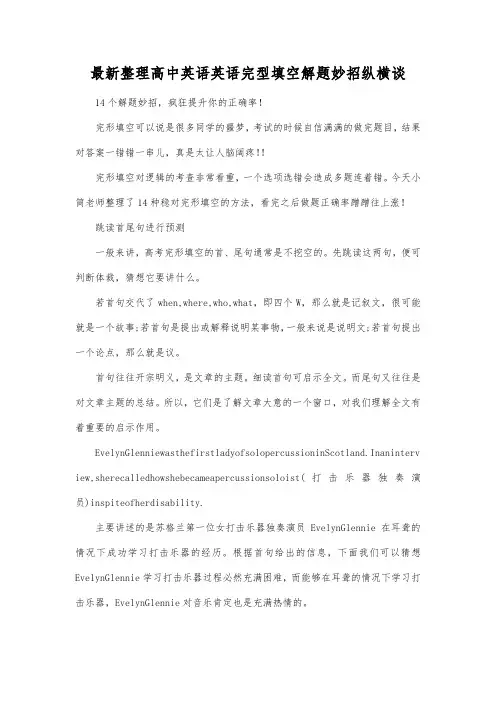
最新整理高中英语英语完型填空解题妙招纵横谈14个解题妙招,疯狂提升你的正确率!完形填空可以说是很多同学的噩梦,考试的时候自信满满的做完题目,结果对答案一错错一串儿,真是太让人脑阔疼!!完形填空对逻辑的考查非常看重,一个选项选错会造成多题连着错。
今天小简老师整理了14种稳对完形填空的方法,看完之后做题正确率蹭蹭往上涨!跳读首尾句进行预测一般来讲,高考完形填空的首、尾句通常是不挖空的。
先跳读这两句,便可判断体裁,猜想它要讲什么。
若首句交代了when,where,who,what,即四个W,那么就是记叙文,很可能就是一个故事;若首句是提出或解释说明某事物,一般来说是说明文;若首句提出一个论点,那么就是议。
首句往往开宗明义,是文章的主题。
细读首句可启示全文。
而尾句又往往是对文章主题的总结。
所以,它们是了解文章大意的一个窗口,对我们理解全文有着重要的启示作用。
EvelynGlenniewasthefirstladyofsolopercussioninScotland.Inaninterv iew,sherecalledhowshebecameapercussionsoloist(打击乐器独奏演员)inspiteofherdisability.主要讲述的是苏格兰第一位女打击乐器独奏演员EvelynGlennie在耳聋的情况下成功学习打击乐器的经历。
根据首句给出的信息,下面我们可以猜想EvelynGlennie学习打击乐器过程必然充满困难,而能够在耳聋的情况下学习打击乐器,EvelynGlennie对音乐肯定也是充满热情的。
利用语法分析解题完形填空虽然以语境填空为主,但也有部分考查语法项目的题目。
对于这类题,考生可以利用平时所学的词汇知识,分析单词(组)的使用范围、动词的及物和不及物,并利用句子结构、句式特点等知识全面衡量所有选项排除干扰。
如:___8___Ihadbeenborninthe16thcentury,Iwouldhavehadnojob.A.BecauseB.WhileC.IfD.Since【解析】根据后面的Ihadbeenborninthe16thcentury可知这只是个假设,是一个虚拟语气的条件句。
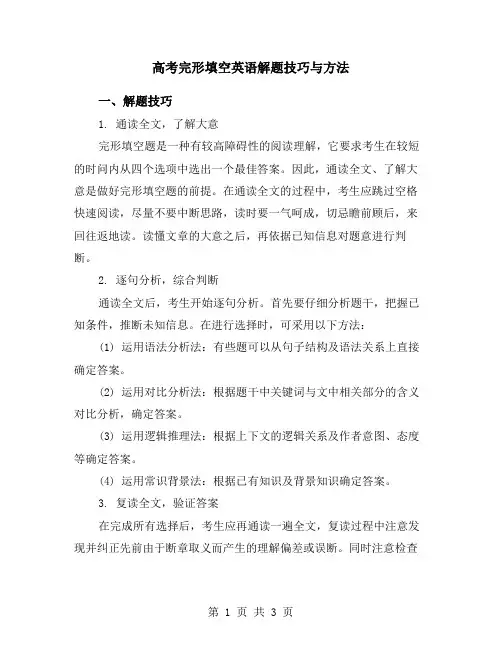
高考完形填空英语解题技巧与方法一、解题技巧1. 通读全文,了解大意完形填空题是一种有较高障碍性的阅读理解,它要求考生在较短的时问内从四个选项中选出一个最佳答案。
因此,通读全文、了解大意是做好完形填空题的前提。
在通读全文的过程中,考生应跳过空格快速阅读,尽量不要中断思路,读时要一气呵成,切忌瞻前顾后,来回往返地读。
读懂文章的大意之后,再依据已知信息对题意进行判断。
2. 逐句分析,综合判断通读全文后,考生开始逐句分析。
首先要仔细分析题干,把握已知条件,推断未知信息。
在进行选择时,可采用以下方法:(1) 运用语法分析法:有些题可以从句子结构及语法关系上直接确定答案。
(2) 运用对比分析法:根据题干中关键词与文中相关部分的含义对比分析,确定答案。
(3) 运用逻辑推理法:根据上下文的逻辑关系及作者意图、态度等确定答案。
(4) 运用常识背景法:根据已有知识及背景知识确定答案。
3. 复读全文,验证答案在完成所有选择后,考生应再通读一遍全文,复读过程中注意发现并纠正先前由于断章取义而产生的理解偏差或误断。
同时注意检查所选答案是否使短文的意思通顺、连贯、合理,是否符合短文所给的信息和要求。
二、解题方法1. 语境考虑法完形填空题的设空注重考查考生对短文内容的整体理解。
所以考生在做题时一定要在通读全文的基础上领会短文的主旨大意,然后根据语法结构、语境及词义关系进行综合分析,再做出判断。
其中,“词不离句”的原则尤为重要。
因为无论什么词都是句子的一部分,而不是孤立的。
所以考生在做题时不能就句论事,而应联系上下文。
通过选项中的词汇或词组所表达的词义及该词在句子中所充当的句子成分来考虑该词与句子中其他词的关系。
考生在做题时还应注意作者的态度和文章的体裁。
2. 词汇复现法词汇复现是语篇中信息的相互衔接的一种常见方式,因此词汇复现法是解决完形填空题最常用的方法之一。
具体做法是:根据设空处的上下文寻找相关的词或短语,并根据这些词或短语在短文中的适当意义来选择正确的答案。
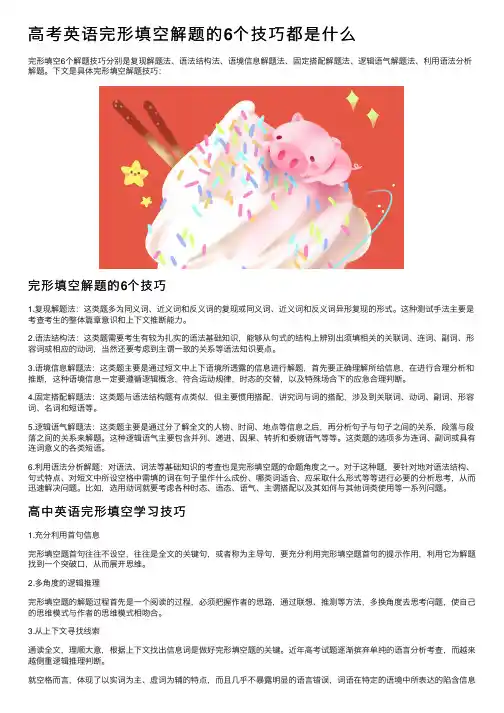
⾼考英语完形填空解题的6个技巧都是什么完形填空6个解题技巧分别是复现解题法、语法结构法、语境信息解题法、固定搭配解题法、逻辑语⽓解题法、利⽤语法分析解题。
下⽂是具体完形填空解题技巧:完形填空解题的6个技巧1.复现解题法:这类题多为同义词、近义词和反义词的复现或同义词、近义词和反义词异形复现的形式。
这种测试⼿法主要是考查考⽣的整体篇章意识和上下⽂推断能⼒。
2.语法结构法:这类题需要考⽣有较为扎实的语法基础知识,能够从句式的结构上辨别出须填相关的关联词、连词、副词、形容词或相应的动词,当然还要考虑到主谓⼀致的关系等语法知识要点。
3.语境信息解题法:这类题主要是通过短⽂中上下语境所透露的信息进⾏解题,⾸先要正确理解所给信息,在进⾏合理分析和推断,这种语境信息⼀定要遵循逻辑概念,符合运动规律,时态的交替,以及特殊场合下的应急合理判断。
4.固定搭配解题法:这类题与语法结构题有点类似,但主要惯⽤搭配,讲究词与词的搭配,涉及到关联词、动词、副词、形容词、名词和短语等。
5.逻辑语⽓解题法:这类题主要是通过分了解全⽂的⼈物、时间、地点等信息之后,再分析句⼦与句⼦之间的关系,段落与段落之间的关系来解题。
这种逻辑语⽓主要包含并列、递进、因果、转折和委婉语⽓等等。
这类题的选项多为连词、副词或具有连词意义的各类短语。
6.利⽤语法分析解题:对语法、词法等基础知识的考查也是完形填空题的命题⾓度之⼀。
对于这种题,要针对地对语法结构、句式特点、对短⽂中所设空格中需填的词在句⼦⾥作什么成份、哪类词适合、应采取什么形式等等进⾏必要的分析思考,从⽽迅速解决问题。
⽐如,选⽤动词就要考虑各种时态、语态、语⽓、主谓搭配以及其如何与其他词类使⽤等⼀系列问题。
⾼中英语完形填空学习技巧1.充分利⽤⾸句信息完形填空题⾸句往往不设空,往往是全⽂的关键句,或者称为主导句,要充分利⽤完形填空题⾸句的提⽰作⽤,利⽤它为解题找到⼀个突破⼝,从⽽展开思维。
2.多⾓度的逻辑推理完形填空题的解题过程⾸先是⼀个阅读的过程,必须把握作者的思路,通过联想、推测等⽅法,多换⾓度去思考问题,使⾃⼰的思维模式与作者的思维模式相吻合。
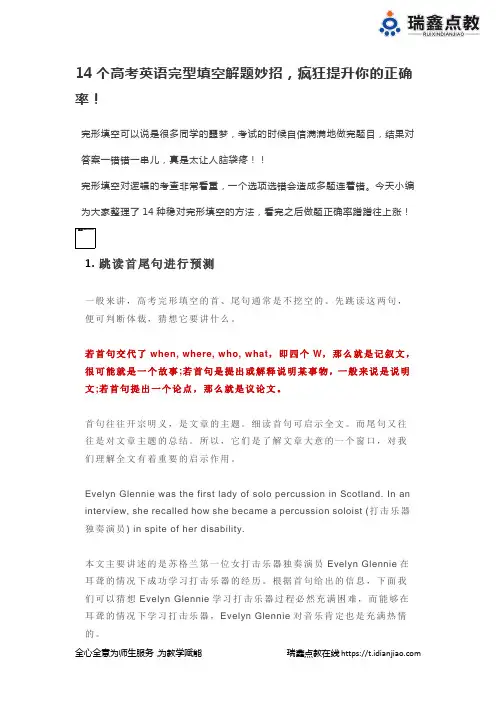
14个高考英语完型填空解题妙招,疯狂提升你的正确率!完形填空可以说是很多同学的噩梦,考试的时候自信满满地做完题目,结果对答案一错错一串儿,真是太让人脑袋疼!!完形填空对逻辑的考查非常看重,一个选项选错会造成多题连着错。
今天小编为大家整理了14种稳对完形填空的方法,看完之后做题正确率蹭蹭往上涨!1.跳读首尾句进行预测一般来讲,高考完形填空的首、尾句通常是不挖空的。
先跳读这两句,便可判断体裁,猜想它要讲什么。
若首句交代了when, where, who, what,即四个W,那么就是记叙文,很可能就是一个故事;若首句是提出或解释说明某事物,一般来说是说明文;若首句提出一个论点,那么就是议论文。
首句往往开宗明义,是文章的主题。
细读首句可启示全文。
而尾句又往往是对文章主题的总结。
所以,它们是了解文章大意的一个窗口,对我们理解全文有着重要的启示作用。
Evelyn Glennie was the first lady of solo percussion in Scotland. In an interview, she recalled how she became a percussion soloist (打击乐器独奏演员) in spite of her disability.本文主要讲述的是苏格兰第一位女打击乐器独奏演员Evelyn Glennie在耳聋的情况下成功学习打击乐器的经历。
根据首句给出的信息,下面我们可以猜想Evelyn Glennie学习打击乐器过程必然充满困难,而能够在耳聋的情况下学习打击乐器,Evelyn Glennie对音乐肯定也是充满热情的。
2.利用语法分析解题完形填空虽然以语境填空为主,但也有部分考查语法项目的题目。
对于这类题,考生可以利用平时所学的词汇知识,分析单词(组)的使用范围、动词的及物和不及物,并利用句子结构、句式特点等知识全面衡量所有选项排除干扰。
如:___8___ I had been born in the 16th century, I would have had no job.A. BecauseB. WhileC. IfD. Since【解析】根据后面的I had been born in the 16th century可知这只是个假设,是一个虚拟语气的条件句。
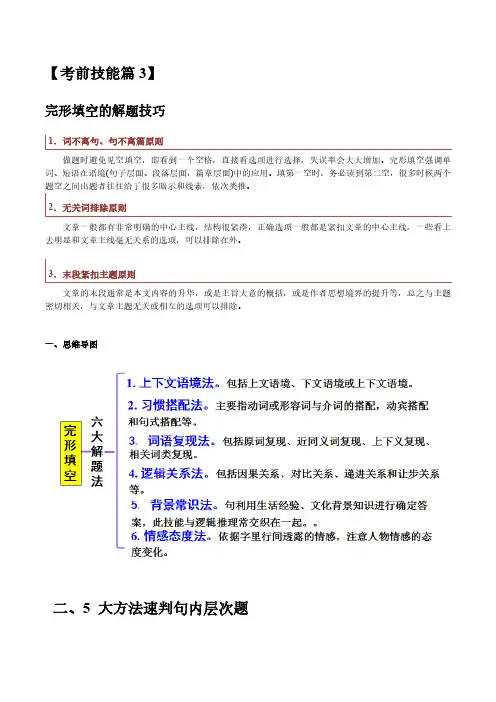
【考前技能篇3】完形填空的解题技巧1.词不离句、句不离篇原则做题时避免见空填空,即看到一个空格,直接看选项进行选择,失误率会大大增加。
完形填空强调单词、短语在语境(句子层面、段落层面,篇章层面)中的应用。
填第一空时,务必读到第二空,很多时候两个题空之间出题者往往给了很多暗示和线索,依次类推。
2.无关词排除原则文章一般都有非常明确的中心主线,结构很紧凑,正确选项一般都是紧扣文章的中心主线,一些看上去明显和文章主线毫无关系的选项,可以排除在外。
3.末段紧扣主题原则文章的末段通常是本文内容的升华,或是主旨大意的概括,或是作者思想境界的提升等,总之与主题密切相关,与文章主题无关或相左的选项可以排除。
一、思维导图二、5 大方法速判句内层次题句内层次题的解题信息分布在本句内,在读懂文意的前提下,利用本句的一些信息凭借语感即可顺利选出答案。
对于此类题目,考生可以边读边填,将原文信息尽量复原。
方法1 利用习惯搭配和固定结构解题[例] [2020·全国卷Ⅱ]It was just after sunrise on a June morning. “Nicolo,” whose real name cannot be __41__ to the public because of Italy's privacy laws, 42.finished working the whole night at a factory in Turin.41.A.attached B.allocatedC.exposed D.submitted分析:本题可以利用习惯搭配解题。
根据下文的“because of Italy's privacy laws”可知主人公的真名是隐私的、不可透露的。
由此可知正确选项。
方法2 利用生活常识和文化背景解题完形填空的语篇中往往渗透着诸如文化科学、历史地理、风俗民情等方面的知识。
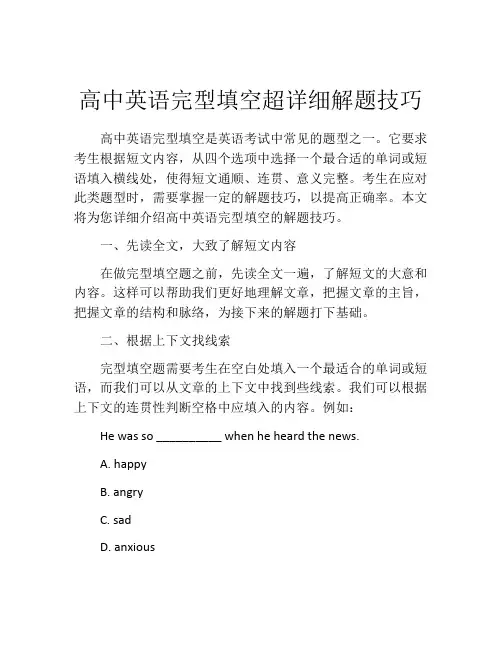
高中英语完型填空超详细解题技巧高中英语完型填空是英语考试中常见的题型之一。
它要求考生根据短文内容,从四个选项中选择一个最合适的单词或短语填入横线处,使得短文通顺、连贯、意义完整。
考生在应对此类题型时,需要掌握一定的解题技巧,以提高正确率。
本文将为您详细介绍高中英语完型填空的解题技巧。
一、先读全文,大致了解短文内容在做完型填空题之前,先读全文一遍,了解短文的大意和内容。
这样可以帮助我们更好地理解文章,把握文章的主旨,把握文章的结构和脉络,为接下来的解题打下基础。
二、根据上下文找线索完型填空题需要考生在空白处填入一个最适合的单词或短语,而我们可以从文章的上下文中找到些线索。
我们可以根据上下文的连贯性判断空格中应填入的内容。
例如:He was so __________ when he heard the news.A. happyB. angryC. sadD. anxious从上下文我们大概可以推测出作者的感情状态,因此答案应该是C。
三、关注词汇和语法关注词汇和语法也是完型填空的解题技巧之一。
我们可以在找到线索的基础上,再关注空格中的语法和词汇。
例如:The talk we had was very __________ and we talked about many things.A. intimateB. freeC. frankD. friendly从前面的句子可以看出,两人的谈话非常畅所欲言,因此应该选C。
四、注意文章结构文章结构也是我们解题时要注意的地方。
我们可以通过观察整篇文章的结构、文章的部分之间的关联性以及重复出现的内容等,来确保答案逻辑合理,符合文章整体思路。
例如:China has the largest population in the world and its__________ composed 56 ethnic groups.A. parliamentB. populationC. constitutionD. composition从前面的句子可以看出,这里应该选D,因为“构成(composition)”更符合逻辑。
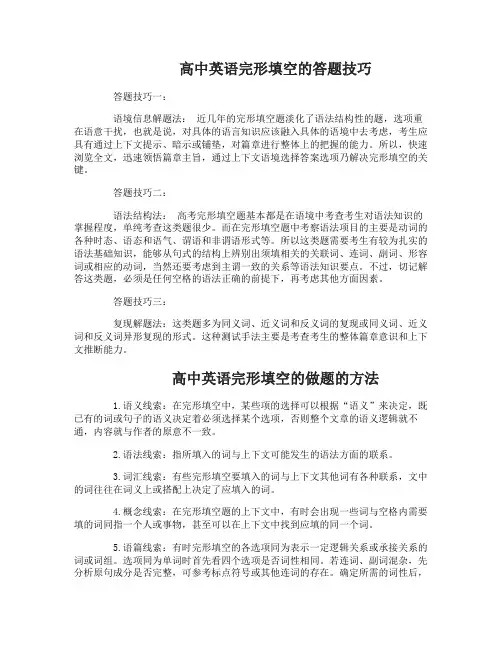
高中英语完形填空的答题技巧答题技巧一:语境信息解题法:近几年的完形填空题淡化了语法结构性的题,选项重在语意干扰,也就是说,对具体的语言知识应该融入具体的语境中去考虑,考生应具有通过上下文提示、暗示或铺垫,对篇章进行整体上的把握的能力。
所以,快速浏览全文,迅速领悟篇章主旨,通过上下文语境选择答案选项乃解决完形填空的关键。
答题技巧二:语法结构法:高考完形填空题基本都是在语境中考查考生对语法知识的掌握程度,单纯考查这类题很少。
而在完形填空题中考察语法项目的主要是动词的各种时态、语态和语气、谓语和非谓语形式等。
所以这类题需要考生有较为扎实的语法基础知识,能够从句式的结构上辨别出须填相关的关联词、连词、副词、形容词或相应的动词,当然还要考虑到主谓一致的关系等语法知识要点。
不过,切记解答这类题,必须是任何空格的语法正确的前提下,再考虑其他方面因素。
答题技巧三:复现解题法:这类题多为同义词、近义词和反义词的复现或同义词、近义词和反义词异形复现的形式。
这种测试手法主要是考查考生的整体篇章意识和上下文推断能力。
高中英语完形填空的做题的方法1.语义线索:在完形填空中,某些项的选择可以根据“语义”来决定,既已有的词或句子的语义决定着必须选择某个选项,否则整个文章的语义逻辑就不通,内容就与作者的原意不一致。
2.语法线索:指所填入的词与上下文可能发生的语法方面的联系。
3.词汇线索:有些完形填空要填入的词与上下文其他词有各种联系,文中的词往往在词义上或搭配上决定了应填入的词。
4.概念线索:在完形填空题的上下文中,有时会出现一些词与空格内需要填的词同指一个人或事物,甚至可以在上下文中找到应填的同一个词。
5.语篇线索:有时完形填空的各选项同为表示一定逻辑关系或承接关系的词或词组。
选项同为单词时首先看四个选项是否词性相同。
若连词、副词混杂,先分析原句成分是否完整,可参考标点符号或其他连词的存在。
确定所需的词性后,再判断逻辑题在原文中所涉及的范围。
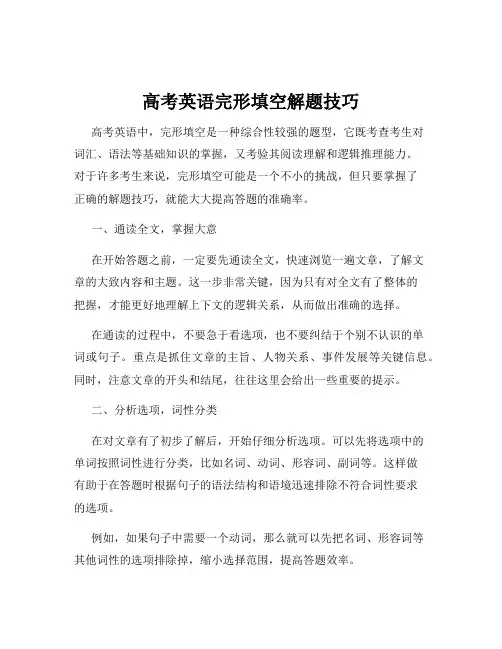
高考英语完形填空解题技巧高考英语中,完形填空是一种综合性较强的题型,它既考查考生对词汇、语法等基础知识的掌握,又考验其阅读理解和逻辑推理能力。
对于许多考生来说,完形填空可能是一个不小的挑战,但只要掌握了正确的解题技巧,就能大大提高答题的准确率。
一、通读全文,掌握大意在开始答题之前,一定要先通读全文,快速浏览一遍文章,了解文章的大致内容和主题。
这一步非常关键,因为只有对全文有了整体的把握,才能更好地理解上下文的逻辑关系,从而做出准确的选择。
在通读的过程中,不要急于看选项,也不要纠结于个别不认识的单词或句子。
重点是抓住文章的主旨、人物关系、事件发展等关键信息。
同时,注意文章的开头和结尾,往往这里会给出一些重要的提示。
二、分析选项,词性分类在对文章有了初步了解后,开始仔细分析选项。
可以先将选项中的单词按照词性进行分类,比如名词、动词、形容词、副词等。
这样做有助于在答题时根据句子的语法结构和语境迅速排除不符合词性要求的选项。
例如,如果句子中需要一个动词,那么就可以先把名词、形容词等其他词性的选项排除掉,缩小选择范围,提高答题效率。
三、结合语境,逐一选择接下来,根据文章的具体语境,从已经分类好的选项中逐一进行选择。
1、注意上下文的逻辑关系文章中的句子和段落之间往往存在着一定的逻辑关系,比如因果关系、转折关系、递进关系等。
通过分析这些逻辑关系,可以更好地理解文章的意思,从而选择出合适的选项。
比如,如果前文提到“天气很好”,后面说“但是我们决定待在家里”,那么这里就需要一个表示转折的词,如“however”“yet”等。
2、利用词汇搭配英语中有很多固定的词汇搭配和习惯用法,在做完形填空时要善于利用这些知识。
例如,“make a decision”(做出决定)、“take part in”(参加)等。
如果选项中有与上下文词汇搭配相符的,那么这个选项很可能就是正确的。
3、关注语法结构句子的语法结构也是选择选项的重要依据。
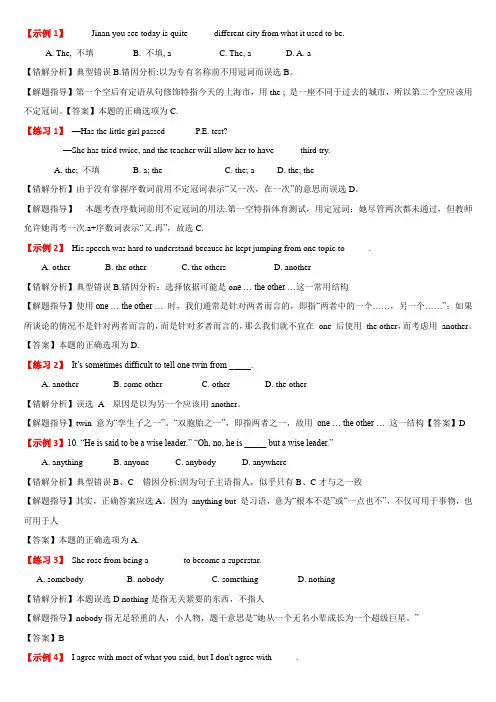
【示例1】_____ Jinan you see today is quite _____ different city from what it used to be.A. The, 不填B. 不填, aC. The, aD. A. a【错解分析】典型错误B.错因分析:以为专有名称前不用冠词而误选B。
【解题指导】第一个空后有定语从句修饰特指今天的上海市,用the ; 是一座不同于过去的城市,所以第二个空应该用不定冠词。
【答案】本题的正确选项为C.【练习1】—Has the little girl passed ______ P.E. test?—She has tried twice, and the teacher will allow her to have _____ third try.A. the; 不填B. a; theC. the; aD. the; the【错解分析】由于没有掌握序数词前用不定冠词表示“又一次,在一次”的意思而误选D。
【解题指导】本题考查序数词前用不定冠词的用法.第一空特指体育测试,用定冠词;她尽管两次都未通过,但教师允许她再考一次.a+序数词表示“又.再”,故选C.【示例2】His speech was hard to understand because he kept jumping from one topic to _____.A. otherB. the otherC. the othersD. another【错解分析】典型错误B.错因分析:选择依据可能是on e … the other …这一常用结构【解题指导】使用one … the other … 时,我们通常是针对两者而言的,即指“两者中的一个……,另一个……”;如果所谈论的情况不是针对两者而言的,而是针对多者而言的,那么我们就不宜在one 后使用the other,而考虑用another。
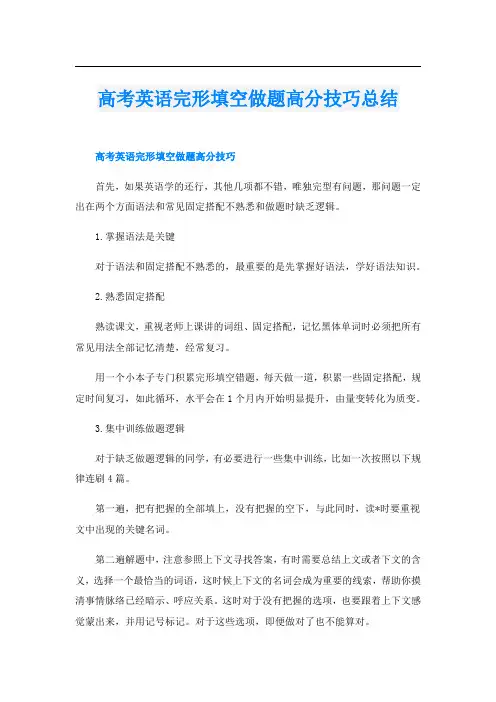
高考英语完形填空做题高分技巧总结高考英语完形填空做题高分技巧首先,如果英语学的还行,其他几项都不错,唯独完型有问题,那问题一定出在两个方面语法和常见固定搭配不熟悉和做题时缺乏逻辑。
1.掌握语法是关键对于语法和固定搭配不熟悉的,最重要的是先掌握好语法,学好语法知识。
2.熟悉固定搭配熟读课文,重视老师上课讲的词组、固定搭配,记忆黑体单词时必须把所有常见用法全部记忆清楚,经常复习。
用一个小本子专门积累完形填空错题,每天做一道,积累一些固定搭配,规定时间复习,如此循环,水平会在1个月内开始明显提升,由量变转化为质变。
3.集中训练做题逻辑对于缺乏做题逻辑的同学,有必要进行一些集中训练,比如一次按照以下规律连刷4篇。
第一遍,把有把握的全部填上,没有把握的空下,与此同时,读*时要重视文中出现的关键名词。
第二遍解题中,注意参照上下文寻找答案,有时需要总结上文或者下文的含义,选择一个最恰当的词语,这时候上下文的名词会成为重要的线索,帮助你摸清事情脉络已经暗示、呼应关系。
这时对于没有把握的选项,也要跟着上下文感觉蒙出来,并用记号标记。
对于这些选项,即便做对了也不能算对。
最后,在对答案或者讲评时,根据答案讲解的思路重新考证,找到选择的原因,并且能够在思维逻辑上连贯地理解。
这一步是提分的关键,经常如此训练,不放过那些“蒙对的题”,就能够帮助你找准出题人思路,以及题目逻辑。
高考英语提高阅读成绩的方法1.细节题如果你不擅长细节题,或者做得慢,说明你在词汇量、长难句分析方面存在严重不足。
对于长难句分析不太擅长,那么就应该每次做完一套阅读理解后,选择你认为最难的一篇,再从头到尾逐句阅读,力求理解每一句的含义。
当遇到长难句时,要采用分析句子成分的方法。
首先提取主句,再看第一个从句、第二个从句等等,如果存在复杂的介词结构,那就要把整个介词结构单独画出来,分析其在句中的作用和含义。
检验的方法是看能否把句子的含义解读清楚。
解读绝对不是翻译,而是英语直接进入理解的状态,也就是会复述,这非常重要。
高考英语完型填空题型答题技巧大全高考英语完形填空是有迹可循的,如果掌握了答题技巧,那完形填空得满分就很容易了. 接下来是小编为大家整理的高考英语完型填空题型答题技巧大全,希望大家喜欢!高考英语完型填空题型答题技巧大全一1. 依据上下文确定答案的法则:从近几年的完形填空题看,近义词或近义短语的测试力度逐渐加强,并成为测试热点。
四个选项不是词义相近,要不就是近义动词的同一种时态的现象,或名词的单复数搭配。
若选项词义差异很大,必然文章中藏有提示语,正因如此,往往第一个选项有时需要读完全篇短文才能准确回答。
2. 词语语义与强于语法原则:完型填空题的首句不留空,目的就是告知短文的故事的四要素:地点、时间、人物和事由。
再则,单纯语法题已基本退出该题型的测试范畴,所以,指导学生时,首先要告知他们这类现象。
尽管四个选项的词语都符合语法规则,然而该题的解答必须遵循先全面理解篇章语义,再结合正确语言结构对每个空格作出准确无误的抉择。
3. 解题四步法原则:第一步:跳读。
带着空格通读全文,了解短文大意,判别短文文体,同时能将会做的题及时解决掉。
第二步:选答。
这一步最为关键,要求考生对每一道题进行认真推敲,但是要告诫他们万万不可按照题的顺序答题,对那些不能拿不准的题先跳过去,遵循先易后难的解题原则。
第三步:推敲。
这实际上就是要求考生对完形填空短文的篇章作通盘考虑,把其中一些需要依据上下文语境来考虑的比较难解答的题,以及句子之间和段落之间的逻辑关联较强的认真推敲,甄别,筛选和抉择。
第四步:复查。
这是解答这类题的最后一步,要求考生解完题之后务必再把文章通读一遍,从整体上准确把握文章的真正意思,及时修改与全文有出入的一些选项。
高考英语完型填空题型答题技巧大全二把握全文明主线;固定搭配记心间;原词再现莫错过;上下求索是关键。
抓主题高中英语完形填空一般第一段和最后一段不设空,大家可以先通读一遍全文,了解一下文章大概写了什么内容,然后文章主旨找到。
高考英语完形填空的3个解题方法和6大答题技巧完形填空设空以实词为主、虚词为辅,单词为主、短语为辅。
动词、名词、形容词、副词、代词等实词通常要占全部小题数的80%以上。
而介词、连词、冠词等虚词则相对考得较少。
完形填空解题步骤可以分以下3步:1.通览----速度全文,把握大意快速阅读一下全文,通过通览全文、领会大意,概略地了解文章的体裁、背景、内容、结构层次、情节、写作风格等等。
2.试填----紧扣文意,瞻前顾后先易后难,逐层深入。
紧扣全文内容,联系上下文和语境,展开逻辑推理,注意从上下文中寻找线索,注意词汇的意义、搭配,惯用法,语法,常识等多个角度进行综合考虑。
3.复核----全面检查,确保语意连贯,用词准确试填后,要把全文再通读一遍,注意看所选答案填入空白处后能否做到文章意思通顺、前后连贯、逻辑严谨、结构完整、首尾呼应。
在解答高考英语完形填空题时,必须具备以下6个解题技巧:1.充分利用文章的上下文和前后句,找到对选择有提示作用的词或句。
这些词有可能是同义词或反义词。
例:Some parts of th e water are very shallow. But in some places it is very, very______.A.deepB.highC. coldD.dangerous解:根据转折连词but的提示,所选的词应与shallow相反,因此选A2.注意固定搭配,包括动词与介词的搭配、动词与名词的搭配以及形容词与名词的搭配等,同时要根据内容选择正确的短语。
3.注意同义词的辨义例:“Give me a hand,”he shouted_____ he got near the boat.A. whileB. tillC. forD. as解:四个选项都可以表示时间。
while强调一段时间内进行的动作,常与进行时连用;till 表示的是动作持续到某时或到某时才开始;for表示的是动作持续了一段时间;as连接的是一个与谓语动作几乎同时发生的动词。
高考完形填空易错点解析完形填空是高考英语考试中常见的题型之一,要求考生根据上下文的语境,选择最佳答案填入空白处,使整个短文内容完整、连贯。
然而,很多考生在做这道题时经常会出现一些易错点。
下面将为大家解析一些易错点,并给出相应的解决方法。
1. 名词类的易混点在完形填空中,常常会出现一些名词类的易混点,比如人称代词、不可数名词、可数名词等。
考生往往会在这些地方选择错误的答案。
解决方法:在做完形填空题时,考生可以先读一遍短文,将划下来的名词或代词加以区分,直观地看出它们应该是哪种类型。
同时,要注重名词与动词之间的一致性,确保答案的准确性。
2. 时态类的易混点在完形填空中,时态类的易混点也比较多见,比如现在时态和过去时态的区分等。
考生容易在这些地方做出错误选择。
解决方法:对于时态类的问题,考生可以通过上下文的时间提示来判断正确的答案。
如果熟悉一些常用的时间状语,也会对做题有所帮助。
此外,注意短文中的时间顺序和动词形式的一致性,能够有效避免错误。
3. 语法类的易混点在完形填空中,还经常会出现一些语法类的易混点,比如动词的时态和语态、谓语动词的主谓一致等。
考生容易在这些地方做出错误的选择。
解决方法:考生可以通过对句子的结构和意思的理解来判断答案。
注意主谓一致的问题,尤其是当主语为复数形式时,要注意谓语动词的变化。
此外,对于被动语态的题目,要注意谓语动词是否需要进行相应的变化。
4. 逻辑类的易混点在完形填空中,逻辑类的易混点也很常见,容易让考生产生困惑。
此类题目通常要求考生根据上下文的逻辑关系,填入合适的答案。
解决方法:考生可以通过理解句子间的逻辑关系来判断答案。
注意句子之间的因果关系、转折关系等,能够更好地理解整个短文的意思,从而准确地选择答案。
在备考完形填空时,考生可以通过对以上易错点的了解,并进行有针对性的练习,提升自己的解题能力。
同时,要注意多读一些原汁原味的英语短文,提高自己的阅读理解能力,对上下文的理解也会更加准确。
⾼考英语完形答题技巧完形填空是英语常考题型,同时也是考⽣们失分很严重的⼀个题型。
那么,⾼考英语完形填空答题技巧有哪些呢?下⾯⼩编给⼤家分享⼀些⾼考英语完形真题答题技巧,希望能够帮助⼤家,欢迎阅读!⾼考英语完形真题答题技巧1、熟记固定搭配在平时的学习中注意积累⼀些常见的固定句式、动词与副词的搭配、名词与形容词的搭配等等,对做完形填空题都⼗分有利。
2、检查有⽆谓语做完形填空题时,有时看似有两个句⼦,于是就选连词,正好掉进命题⼈设计的陷阱。
事实上,有时貌似句⼦的"句⼦"却没有谓语,其中的动词只是⼀个⾮谓语动词(多为分词)。
3、查看有⽆连词若经查实,前后的确是两个句⼦,就要看其中的⼀个分句是否已经⽤了连词。
若已经有连词,⼀般不再⽤连词;若还没有⽤连词,就⼀定要选连词。
4、正确把握语境有时孤⽴地看留空格的那个句⼦,好像多个答案都可以,但与上下句的意思联系起来,就会发现问题。
因此,做完形填空题时⼀定要正确把握语境。
5、分析逻辑关系根据复合句和并列句的知识,句⼦与句⼦之间有着不同的逻辑关系,或是从属关系,或是并列关系。
从句⼦的意义和逻辑关系来看,从句可表⽰时间、原因、条件、结果、⽬的、⽐较、⽅式等,句⼦之间还可以是限定关系、同位关系、并列关系、递进关系、让步关系、转折关系等。
分析句⼦之间的逻辑关系的主要依据是句意和上下⽂之间的逻辑。
完形填空怎么得⾼分1.通读全⽂,掌握⼤意。
做题前⾸先要把⽂章粗略浏览⼀遍,把握⽂章的基调,了解⽂章的中⼼思想。
切忌在没有把握⽂章⼤意前,匆匆盲填⼀遍。
或⼀⼀对空格选填。
2.把握⽂章⾸句,理解全⽂⼤意。
完形填空⽂章的⾸句⼀般都是完整的,其⽬的是给答题者⼀个整体思路,他是观察⽂章的窗⼝。
有时候⽂章⾸句概括了整篇⽂章的中⼼;有时候则设下悬念,引出下⽂。
⼤多数情况下,从⽂章的⾸句都可以判断出⽂章的体裁。
把握好⽂章的⾸句,对理解全⽂都有好处。
3.把握上下⽂关系。
做完形填空题时应⼀次读两三个句⼦,⼀次性填⼏个空,⽽不要⼀个空格⼀个空格的割裂开来填。
矿产资源开发利用方案编写内容要求及审查大纲
矿产资源开发利用方案编写内容要求及《矿产资源开发利用方案》审查大纲一、概述
㈠矿区位置、隶属关系和企业性质。
如为改扩建矿山, 应说明矿山现状、
特点及存在的主要问题。
㈡编制依据
(1简述项目前期工作进展情况及与有关方面对项目的意向性协议情况。
(2 列出开发利用方案编制所依据的主要基础性资料的名称。
如经储量管理部门认定的矿区地质勘探报告、选矿试验报告、加工利用试验报告、工程地质初评资料、矿区水文资料和供水资料等。
对改、扩建矿山应有生产实际资料, 如矿山总平面现状图、矿床开拓系统图、采场现状图和主要采选设备清单等。
二、矿产品需求现状和预测
㈠该矿产在国内需求情况和市场供应情况
1、矿产品现状及加工利用趋向。
2、国内近、远期的需求量及主要销向预测。
㈡产品价格分析
1、国内矿产品价格现状。
2、矿产品价格稳定性及变化趋势。
三、矿产资源概况
㈠矿区总体概况
1、矿区总体规划情况。
2、矿区矿产资源概况。
3、该设计与矿区总体开发的关系。
㈡该设计项目的资源概况
1、矿床地质及构造特征。
2、矿床开采技术条件及水文地质条件。